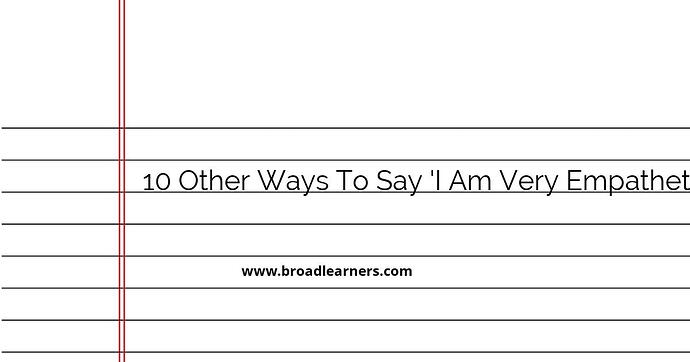Empathy is the ability to understand and share the feelings of others. It is an important quality to possess, especially in personal and professional relationships.
If you want to express your empathy but want to avoid using the same phrase over and over again, here are 10 alternative ways to say 'I am very empathetic':
- I understand how you feel
- I can imagine what you're going through
- Your feelings are important to me
- I can relate to your situation
- I feel for you
- I'm here for you
- You're not alone, I'm here to support you
- I can empathize with your emotions
- I genuinely care about your feelings
- Your pain resonates with me
Now, let's explore each alternative in more detail:
1. I understand how you feel
This phrase is a straightforward way to convey empathy. It shows that you have a good understanding of the other person's emotions and can relate to their situation.
Example: 'I understand how you feel. Going through a breakup is never easy.'
2. I can imagine what you're going through
By saying this, you are acknowledging the other person's experience and trying to put yourself in their shoes. It demonstrates your ability to empathize with their situation.
Example: 'I can imagine what you're going through. Losing a loved one is incredibly difficult.'
3. Your feelings are important to me
This statement emphasizes that you genuinely care about the other person's emotions. It reassures them that their feelings matter to you.
Example: 'Your feelings are important to me. Please know that I'm here to listen and support you.'
4. I can relate to your situation
By saying this, you are indicating that you have experienced something similar or have faced a similar challenge. It helps the other person feel understood and validated.
Example: 'I can relate to your situation. I've also struggled with anxiety in the past.'
5. I feel for you
This phrase expresses your sympathy and compassion towards the other person's situation. It shows that you genuinely care about their well-being.
Example: 'I feel for you. Dealing with a difficult boss can be incredibly stressful.'
6. I'm here for you
By saying this, you are letting the other person know that you are available to provide support and assistance whenever they need it. It conveys your willingness to be there for them.
Example: 'I'm here for you. If you ever need someone to talk to, I'm just a phone call away.'
7. You're not alone, I'm here to support you
This statement reassures the other person that you are by their side and will provide them with the necessary support. It helps them feel less isolated in their struggles.
Example: 'You're not alone, I'm here to support you. We'll get through this together.'
8. I can empathize with your emotions
By using this phrase, you are expressing that you can understand and share the other person's emotions. It shows that you are capable of connecting with their feelings.
Example: 'I can empathize with your emotions. It's natural to feel overwhelmed during times of uncertainty.'
9. I genuinely care about your feelings
This statement emphasizes your sincere concern for the other person's emotions. It lets them know that you are invested in their well-being.
Example: 'I genuinely care about your feelings. Your happiness and comfort are important to me.'
10. Your pain resonates with me
By saying this, you are conveying that you can deeply understand and connect with the other person's pain. It acknowledges the intensity of their emotions.
Example: 'Your pain resonates with me. I've been through a similar situation, and it's never easy.'
Did I miss anything? Respond below
